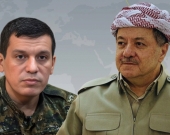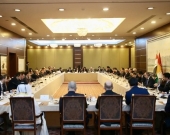Pakistani Taliban meet to pick Mehsud's successor

Mehsud, who had a $5 million US government bounty on him, was buried late Friday after being killed along with four associates when a drone targeted his car in a compound in North Waziristan tribal district.
His death came as a major blow to the Tehreek-e-Taliban Pakistan (TTP) network, which was behind some of the most high-profile attacks in Pakistan in recent years, including the 2008 bombing of the Islamabad Marriott hotel and the attempt to kill schoolgirl activist Malala Yousafzai last year.
Tribesmen opened fire on Saturday at a US drone flying low over the area where Mehsud was killed, while a few kilometres away the usually busy market in North Waziristan's main town Miranshah was virtually deserted.
"Local people are scared. The death of Hakimullah Mehsud has created uncertainty. Everyone is talking about Taliban revenge," shopkeeper Tariq Khan told AFP.
Mehsud's death is the third major blow struck against the TTP by the US this year, after the killing of number two Waliur Rehman in a drone strike in May and the capture of another senior lieutenant in Afghanistan last month.
The TTP's supreme shura, or decision-making council, met Saturday to decide who should now lead the faction, a loose coalition of militant groups that emerged in the wake of a deadly 2007 military raid on the radical Red Mosque in Islamabad.
"The members of the supreme shura are taking opinions from all the shura members and senior commanders," a Taliban commander told AFP.
"The decision may take more time because the shura members are constantly changing the meeting place."
It is common practice among militants in the tribal areas to move around frequently to avoid the attentions of the US drones that hover in the sky almost continuously.
Among the candidates in the frame to replace Mehsud is Maulana Fazlullah, also known as Mullah Radio, a radical cleric who led Taliban's hardline two-year rule in the Swat Valley which ended in a military operation in 2009.
Mehsud's death represents a success for the CIA's drone programme against suspected militants at a time when it is under intense scrutiny over civilian casualties.
Security expert Rahimullah Yusufzai told AFP it was unclear whether the TTP has anyone in its ranks capable of filling the gap left by the charismatic Mehsud.
"His death will weaken the movement. Although they will soon appoint a new chief it is to be seen how effective the new person will be in controlling things," Yusufzai said.
After a bloody six-year TTP insurgency which has left thousands of soldiers, police and civilians dead, the government has been edging towards talks with the militants.
Peace talks in doubt
Mehsud's death came just a day after the government said the "process of dialogue" with the Taliban had started but no formal talks had taken place.
Saifullah Khan Mehsud of Islamabad's FATA Research Center, an expert on Pakistan's tribal belt, said the killing of the Taliban commander would disrupt the peace process in the short term but could ultimately prove beneficial.
"Of course for the time being there will be perhaps... a call for an end to the dialogue process, but in the long run a divisive figure like Hakimullah Mehsud not being there will make the environment more conducive for peace negotiations."
After TTP founder Baitullah Mehsud was killed in a drone strike in August 2009, Mehsud took the leadership following a bitter power struggle.
His death was widely reported in 2010 but he resurfaced in a video taunting the West and vowing more attacks on US targets.
As well as the Marriott bombing and Malala attack, the TTP claimed the 2010 Times Square bomb plot after training Pakistani-American Faisal Shahzad.
The United States charged Mehsud with terrorism after seven CIA agents were killed in a suicide attack by an Al-Qaeda double agent at Camp Chapman in Afghanistan, the deadliest attack on the agency since 1983.
US drone strikes are hugely unpopular in Pakistan, where the government condemns them as a violation of sovereignty and counterproductive in the fight against militancy.
Former cricketer Imran Khan, leader of the Pakistan Tehrek-e-Insaaf (PTI) party that rules in northwestern Khyber Pakhtunkhwa province, said the drone strike had "sabotaged" peace talks.
"It has proved that they (the Americans) do not want peace in Pakistan," said Khan, who said PTI would move to block the transit of NATO supplies through Khyber Pakhtunkhwa to Afghanistan.
Global Post












